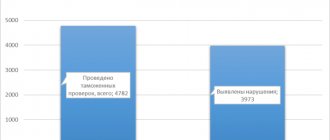Five cases where the courts applied the explanations of the “customs” Plenum
The resolution on disputes under the Customs Code of the Eurasian Economic Union was adopted in November 2021. The Supreme Court has developed a new document that will replace the old clarifications, because the new code came into force in 2021. It is a complex piece of legislation, containing 465 articles and 300 references to other provisions, and has been applied and interpreted by courts in different ways. The new regulation was intended to help make the practice more uniform. Judging by how actively the courts use it in their work, it fulfills its purpose.
Acceptable defects
Many of the explanations given by the Plenum of the Supreme Court are aimed at protecting the rights of declarants who import goods into Russia. For example, he introduced a presumption of reliability of information and documents that the declarant provides during customs control. The burden of refuting the authenticity now lies with the customs authority.
Without formalism at customs: the Economic Board clarified the rules of transit
In the dispute between VSK LLC and Samara customs, first the 11th AAS, and then the Arbitration Court of the Volga District applied this presumption. The company imported equipment for the production of kvass into Russia and calmly transported it through customs, but then the customs changed its mind and began to annoy VSK with inspections. Officials decided that the company had incorrectly declared the goods. The courts supported VSK in this dispute because the FCS did not provide evidence of the unreliability of the annexes to the contract, which aroused suspicion. “The customs authority did not indicate on what basis it was concluded that the annexes to the contract submitted by VSK LLC were unreliable,” the district court indicated (case No. A72-9685/2019).
The right to choose the method of judicial protection
The clarifications of the Plenum of the Supreme Court give participants in customs disputes the opportunity to go directly to court with a demand for the return of customs payments. To submit such an application, there is no need to first challenge the decision of the customs authority that served as the basis for excessive customs payments to the budget.
The Arbitration Court of the Pskov Region applied these clarifications in case No. A52-4506/2019. The company in court demanded the return of the overpayment of customs duties that it paid when importing spare parts for engines. The court recalled that the choice of a method of protecting a violated or disputed right is the subjective right of the applicant. And if he decides to immediately file a property claim against customs (bypassing the appeal of the decision to adjust the customs value), then he can do this.
As a result, the company successfully returned the overpayments, and the decision of the first instance was later upheld by the appeal court.
A useful analogy in a tax dispute
A study of practice has shown that courts apply the clarifications of the Plenum of the Supreme Court on customs disputes not only within the framework of customs disputes.
Second review of Supreme Court practice: bankruptcy, rent, taxes
In case No. A56-122222/2019, an entrepreneur challenged the decision of the MIFTS to hold him accountable for underpayment of taxes. The businessman went to court and asked to restore the missed deadline for filing an application. He explained the delay by the fact that he first decided to appeal the decision of the MIFTS through an appeal to the Federal Tax Service. And after the appeal was rejected, the entrepreneur filed an application to the court.
The Arbitration Court of St. Petersburg and the Leningrad Region referred to the paragraph in the clarifications of the Supreme Court, according to which a person who has chosen the administrative method of appeal cannot be limited in the right to judicial protection. “The period of administrative appeal against decisions, actions (inaction) of the customs authority, including if the complaint has not been considered on its merits, is not included in the period for filing a lawsuit,” the Plenum of the Supreme Court stated. The court applied this rule by analogy and restored the missed deadline. True, this did not help the complainant, because the tax authorities defended the decision to assess additional taxes.
Plenum on sustainable practices
The resolution of the Plenum of the Supreme Court enshrines the principles of “maintaining trust in the law and the actions of the state, and the inadmissibility of giving retroactive effect to new customs regulations that worsen the situation of participants in foreign economic activity.” It’s one thing to put principles down on paper, but quite another to put them into practice. In the framework of case No. A51-24425/2018, the Collegium for Economic Disputes of the Supreme Court explained when these principles will help not to overpay for “customs clearance” of goods.
The Economic Board gave clarifications for the commercial rental market
The Zeppelin Society imported diapers into Russia through Vladivostok customs. The HS code for foreign economic activity was declared 9619 00 8109 (baby diapers and diapers made of other materials). Later, the company asked to change the customs classification of goods (to 9619 00 8101 - baby diapers and diapers made of paper pulp, paper, cellulose wadding or cellulose fiber cloth) and return almost 100,000 rubles to him. overpayment of customs duties. Vladivostok customs admitted that the HS code was initially determined correctly. Therefore, the money was not returned to the applicant. The courts found no violations, and then the Zeppelin Society complained to the Supreme Court. In its complaint, the organization indicated that the courts did not take into account the current practice of classifying the disputed product.
The Economic College found that for many years there had indeed been a consistent practice that made it possible to classify goods exactly as the Zeppelin Society wanted. “The decision was retroactive in nature and led to a worsening of the situation of a participant in foreign economic activity, who had the right to count on the return of customs duties after the release of goods,” the judges indicated and ordered the dispute to be reconsidered in the first instance, but this time so that the rights of society and principles prescribed in the resolution of the Plenum.
Penalty protection
The Gazprom Export Company provided the Central Energy Customs with a complete customs declaration (CDD). After some time, the parties to the gas supply agreement agreed to increase the cost, which is why Gazprom Export asked to adjust the PVD. Because of this, the amount of customs duty has also increased. At customs they decided that a penalty could be charged for this difference, and wrote about it in the declaration.
The courts did not agree with this approach. They indicated that, in accordance with the explanations of the Plenum of the Supreme Court, the declarant has the right to correct the declaration even after the release of the goods. For example, if the price of a product changes. But customs can make changes only if they recognize the information from the PVD as unreliable, but there was no reason for this. The cost of the transaction at each stage of customs clearance was not disputed and was recognized as justified directly by the customs authority, therefore there were no grounds for adjusting the declaration (case No. A40-206172/2019).
- Maxim Varaksin
Customs disputes challenging the actions of customs officials.
The following classification will be conditional, based on a generalization of law enforcement practice:
— Disputes regarding the calculation of the customs value of goods;
— Challenging the refusal of customs to apply benefits for customs clearance in relation to goods;
— Disputes regarding classification codes of goods according to the Commodity Nomenclature of Foreign Economic Activity;
— Complaints regarding refusals of customs authorities to apply established tariff preferences - according to the country of origin of the Goods;
— Disputes regarding the return or offset of customs duties.
In all of these cases, the actions of customs officials create additional obligations for the declarant, or increase the size of an existing obligation, which is always not in the interests of the declarant. Thus, if the official does not agree with the customs value of the goods indicated by the declarant, or the selected code according to the Commodity Nomenclature of Foreign Economic Activity, the official can independently make an adjustment. Disputes related to the calculation of the customs value of goods are the most numerous category of court cases related to challenging the actions of customs authorities.
General information about the customs destruction procedure
ATTENTION!
We work only with legal entities. How exactly the customs destruction procedure should be carried out (in this context the term “disposal” will also be used in the same meaning) is set out in Art. 248 of the Customs Code of the EAEU. This measure applies only to foreign-made food and non-food products.
Article 249 of the EAEU Customs Code also specifies the conditions under which foreign-made products are placed under this procedure. It also establishes categories of goods that are not subject to disposal and methods that are not applicable for the operation in question. The Commission of the Eurasian Economic Union has the right to determine additional categories of goods that are not subject to destruction, but today there are no such lists of the Commission.
Waste generated as a result of the procedure is placed under the customs procedure of release for domestic consumption (IM 40) only if its use is profitable from an economic point of view. Therefore, they try to destroy goods in such a way that no such waste remains.
For example, at Vyborg customs in February 2021, about a ton of imported products was destroyed. Among them are fish, meat and dairy products. The expiration dates were all right, but the fact is that these products were supplied from countries on the sanctions list. Customs officers seized the goods at the border and burned them in a high-temperature oven. In this case, the seized products can no longer be returned or sold. It is destroyed without paying any duties or taxes.
And another case of customs destruction occurred in Kaliningrad, where a shipment of toys from China was detained at customs. The cargo was detained in the seaport of Baltiysk. The toys turned out to be counterfeit; they did not have the necessary quality certificates, looked fake in appearance and emitted an unpleasant chemical smell. The entire batch was destroyed by tracked bulldozers at the site. The task is not just to break the toys, but to turn them into a mass of very small pieces, which will then be poured into a hole and leveled to the ground.
The procedure for placing foreign goods under the customs procedure for destruction
The general procedure for recycling goods consists of three steps:
- The stage of obtaining permission, consisting of two sequential actions:
- Obtaining a conclusion from the Ministry of Natural Resources indicating the possibility, territory and method of liquidation of goods. Regulated by order of the Ministry of Natural Resources dated September 9, 2011 No. 732.
- Obtaining a disposal permit from the customs office in the region of operation of which it is planned to submit the corresponding declaration (IM 93); regulated by order of the Federal Customs Service of Russia dated February 7, 2011 No. 216.
At this stage, the declarant indicates the deadlines for the liquidation of foreign products, sufficient for filing and issuing a declaration for goods in the customs destruction procedure and actually carrying out operations for their disposal at the landfill.
It is also important to note that it is necessary to indicate the reason for removing the goods from circulation (the reason why they should be destroyed). For food products, the cause is usually expiration.
- The stage of filing a Declaration for goods and placing them under the procedure.
- The stage of actual disposal at the time and place, in accordance with the permission received from customs at stage A).
At this stage, for actual observation, an official of the customs authority of the Russian Federation also goes to the site where the destruction of goods placed under the procedure will take place.
After actual liquidation, a corresponding act is drawn up in 3 copies: one for each signatory, which is signed by the declarant, the person who carried out the destruction, and the customs official (Order of the Federal Customs Service of Russia dated December 22, 2010 No. 2523).
Administrative customs disputes.
The Code of Administrative Offenses of the Russian Federation contains an impressive list of offenses related to the movement of goods across the state border of the Russian Federation and customs clearance. At the same time, the punishment for committing customs violations is serious: fines for legal entities, as a rule, amount to hundreds of thousands of rubles and are associated with confiscation of the entire consignment of goods in relation to which the declarant made mistakes.
When a customs violation is detected, an official draws up a protocol and often orders an administrative investigation. Both the heads of customs authorities and the court can be held administratively liable when transferring protocols and case materials on certain violations.
Administrative disputes on bringing to responsibility for committing customs violations, or challenging decisions of customs officials on bringing to responsibility are also one of the most common categories of arbitration cases in the field of customs legislation.



